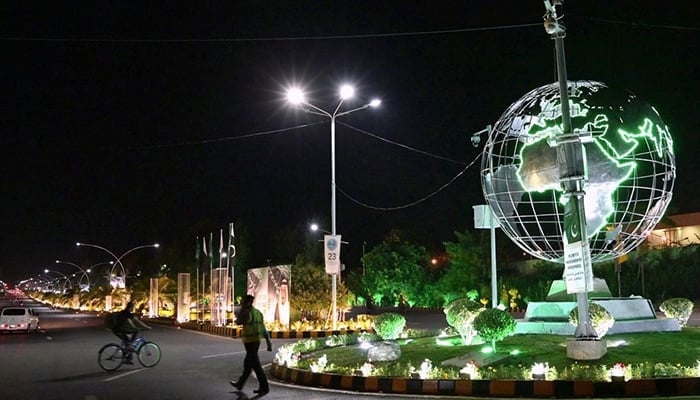Golden opportunity
Currently, Pakistan is facing serious challenges at the internal level
Hosting the Summit of the Shanghai Cooperation Organisation, the most significant top-level international forum that consists of 10 member states and two observers from Eurasia, at the federal capital of Islamabad is indeed a great honour for Pakistan.
Historically, the top leadership of five countries, including the People's Republic of China, Russia, Kazakhstan, Kyrgyzstan, and Tajikistan had entered into an accord on Deepening Military Trust in Border Regions in 1996, to form the Shanghai Five. Later, with the inclusion of Uzbekistan in 2005, it was renamed the Shanghai Cooperation Organization (SCO). In 2017, Pakistan and India also officially joined as full members, followed by Iran and Belarus. Every year, a member state is required to host its annual meeting, in which the heads of state ensure their participation.
Initially, a mysterious silence was adopted by the Indian government, when an invitation to Indian Prime Minister Narendra Modi was sent to participate in the SCO Summit, to be held in Islamabad. This is why, when it was officially confirmed that Indian Foreign Minister Jaishankar would travel to Islamabad, it was seen as an important development on the diplomatic front. The international media is rightly marking it as a breakthrough in bilateral ties between New Delhi and Islamabad.
The visit will be the first by an Indian foreign minister to Pakistan in nearly a decade, as Sushma Swaraj (late) was the last Indian foreign minister who visited Pakistan in 2015. I still remember that Sushma-ji showed special interest when I conveyed the peace message to her during my visit to India. Unfortunately, after her death, bilateral relations became tense day by day.
Confirmation of India's participation in the SCO Summit has also intensified the ongoing discussion in the media about whether the arrival of the Indian delegate in Islamabad will lead to ice melting between two neighbouring countries. Last year, a similar debate was also observed when former foreign minister Bilawal Bhutto Zardari participated in the SCO foreign ministers meeting held in Goa.
Currently, Pakistan is facing serious challenges at the internal level. On the one hand, some unwanted elements are trying hard to advance their anarchic agenda under the guise of protest. Anti-state militants, on the other hand, have started to sabotage law and order at the behest of external powers. International analysts are therefore terming the current situation of Pakistan as a perfect storm – the country forced to face challenges emerging from different sides simultaneously.
In my view, Pakistan and India are two unique countries on the world map that not only share a common history of thousands of years but also their present and future are connected. There is a dire need for India to find a peaceful solution to resolve the conflicts amicably. Similarly, we should also understand that the election results in India this year have dealt a severe blow to the Modi-led BJP government, and now the peaceful elements are gradually gaining strength across the border.
In the past, several Indian prime ministers – including Atal Bihari Vajpayee and Narendra Modi – had visited Pakistan, but unfortunately, we failed to achieve any significant success diplomatically due to their arrival in our country. Today, in the form of the SCO Summit, Pakistan has another golden opportunity and we must avail it to project a positive image as a peace-loving host country.
In my view, the visit of the Indian foreign minister to Pakistan can prove to be very effective in improving bilateral relations, but for this, we must devise a concrete line of action. At present, the eyes of millions of peace-loving people living in Pakistan and India are focused on the Shanghai Cooperation Organization (SC)). We should try our best to melt the ice in every way for the sake of world peace, regional stability and the betterment of the people.
The writer is a member of the National Assembly and patron-in-chief of the Pakistan Hindu Council.
He tweets/posts @RVankwani
-
 Real Reason Why 'Only Murders In The Building' Cast Didn't Attend 2026 Actor Awards
Real Reason Why 'Only Murders In The Building' Cast Didn't Attend 2026 Actor Awards -
 Prince William Makes Big Decision After Princess Eugenie, Beatrice Ban
Prince William Makes Big Decision After Princess Eugenie, Beatrice Ban -
 GLP-1 Drugs Linked To Osteoporosis And Gout: New Study Reveals Higher Risks
GLP-1 Drugs Linked To Osteoporosis And Gout: New Study Reveals Higher Risks -
 Seth Rogen Unveils Catherine O’Hara's Distinguished Quality In Emotional Tribute
Seth Rogen Unveils Catherine O’Hara's Distinguished Quality In Emotional Tribute -
 MWC 2026: New Smartphones, AI Gadgets And Tech Innovations Revealed
MWC 2026: New Smartphones, AI Gadgets And Tech Innovations Revealed -
 King Offers Harry, Meghan Markle A 30 Bedroom Lodge Despite Its Decades Of Baggage: ‘it’s An Olive Branch’
King Offers Harry, Meghan Markle A 30 Bedroom Lodge Despite Its Decades Of Baggage: ‘it’s An Olive Branch’ -
 Selma Blair Talks About How Her Debilitating Disease Is 'misunderstood'
Selma Blair Talks About How Her Debilitating Disease Is 'misunderstood' -
 China’s 5-year Tech Strategy: What To Expect At Annual Parliament Meeting Amid Rivalry With West
China’s 5-year Tech Strategy: What To Expect At Annual Parliament Meeting Amid Rivalry With West -
 Andrew’s Total Meltdown On The Day Of Eviction: Insider Breaks It Down Word For Word
Andrew’s Total Meltdown On The Day Of Eviction: Insider Breaks It Down Word For Word -
 Michael J. Fox Stuns Actor Awards Audience With Rare Confession Amid Parkinson's Disease
Michael J. Fox Stuns Actor Awards Audience With Rare Confession Amid Parkinson's Disease -
 Beatrice’s In-laws Stand Against Her Marriage: ‘Furious Their Son Is Wrapped Up In Wreckage’
Beatrice’s In-laws Stand Against Her Marriage: ‘Furious Their Son Is Wrapped Up In Wreckage’ -
 Jessie Buckley Utters 'wild' Remarks For 'Hamnet' Co-star Emily Watson At Actor Awards
Jessie Buckley Utters 'wild' Remarks For 'Hamnet' Co-star Emily Watson At Actor Awards -
 Who Could Replace Ayatollah Ali Khamenei? Iran’s Top Successor Candidates Explained
Who Could Replace Ayatollah Ali Khamenei? Iran’s Top Successor Candidates Explained -
 Oliver 'Power' Grant Cause Of Death Revealed
Oliver 'Power' Grant Cause Of Death Revealed -
 Michael B. Jordan Makes Bombshell Confession At Actor Awards After BAFTA Controversy: 'Unbelievable'
Michael B. Jordan Makes Bombshell Confession At Actor Awards After BAFTA Controversy: 'Unbelievable' -
 Prince William Willing To Walk Road He ‘loathes’ For ‘horror Show’ Escape: ‘He’s Running Out Of Allies Fast’
Prince William Willing To Walk Road He ‘loathes’ For ‘horror Show’ Escape: ‘He’s Running Out Of Allies Fast’




